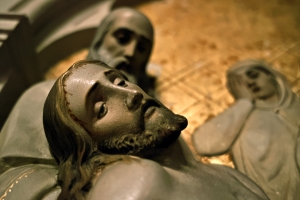 In my last article, I told the remarkable story of the 40 Martyrs of Sebaste. But, inspiring as that story is, I held back what is, to me, the most powerful part of all.
In my last article, I told the remarkable story of the 40 Martyrs of Sebaste. But, inspiring as that story is, I held back what is, to me, the most powerful part of all.
Again, some details of the story may vary slightly, but almost all of the stories are careful to include a lone woman. This woman was the mother of the youngest martyr, and her silent presence served to encourage all the martyrs to remain strong in their faith.
During the attempts to freeze and then torture the martyrs, and even as they headed off to be burned alive, she stayed close to them and never faltered in her own faith. A soldier, taking pity on the woman, encouraged her to take her son home while he could still be saved. She refused, knowing no matter how painful losing her beloved son would be, she could not deny him the martyrdom to which he had so willingly assented.
What kind of woman could send her son to his death when she could have saved him?
A woman very much like Mary.
Father Pablo Straub once gave a talk entitled “Would You Hang Your Son on a Cross?” His talk revolved around God’s greater plan for our salvation and the unconditional “yes” Jesus gave to his Father’s plan. While Father Straub’s talk focused on the Father’s will and Jesus’ acceptance of it, I cannot help but think of Mary’s fiat as well. Not her acceptance of the Incarnation, but her acceptance of the cross.
Many Christians have missed Mary’s powerful story, hidden throughout the Gospels. But sometimes it is necessary to bring Our Lady forward to learn from her quiet yet prevailing example. I am speaking specifically of the wedding feast at Cana - a story so important for us to meditate on, it is repeated in the story of the 40 Martyrs of Sebaste, just in case we did not catch it the first time around.
Contained within the 1889 translation of the Douay-Rheims Bible is a treasure that has since been omitted in later translations. The 1889 translation is the last time we hear Jesus say something most Christians have not heard before, and it’s tragic absence has caused much confusion among Christians in interpreting this scene, so I bring it to you now to ponder and to know a little more deeply what the original scriptures wanted us to know. After Mary tells her Son the wine had run out, the original translation reads Our Lord’s response as, “Woman, what is that to me and to thee? My hour is not yet come.” (John 2:4)
When we hear “and to thee”, it shows the inseparable bond between the mother and the Son in God’s great plan. Though few words are spoken between mother and Son, there is within this scene clarification, acceptance and obedience. “Do you understand what this miracle you ask me to perform will mean for me? And what it will mean for you?” He makes it clear that if she continues to encourage him, there can be no turning back.
Any time Jesus refers to his “hour”, he speaks of his passion, and he reminds her here that once he begins his public ministry through this miracle, she is in essence sending him to his death. She understands this and for love, for charity and to fulfill God’s holy will no matter what the personal cost, it is she who sends her Son off to his 3-year ascent to Calvary.
Jesus, and the martyrs, chose their crosses themselves. And while the mothers may have held some sway in when the impending crosses for their sons might be erected, they ultimately could not nor should not interfere with God’s plan. To do so might have temporarily prolonged their sons’ lives, but ultimately it would have been a grave loss to us all.
As a mother, I am deeply humbled by the heroic virtue Mary and the martyr’s mother possessed. Could I willingly send one of my children to the cross? I think it would be much easier to send myself there for the sake of my children. It is the kind of nightmare a parent hopes will never come true. Yet, as parents, we are called to bring up God’s children to be saints. And sometimes, to become a saint, martyrdom is necessary.
As you continue your Lenten journey this year, consider this: have you taught your children to follow in Our Lord’s steps and to sacrifice self for the sake of others? Have you raised them to love God above all worldly things? Do they have the hope and faith required to go through martyrdom, no matter what form it may come in? And, should God require it of you, do you have the hope and faith required to allow your own child to choose to hang on a cross?
Copyright 2011 Cassandra Poppe
About the Author

Guest
We welcome guest contributors who graciously volunteer their writing for our readers. Please support our guest writers by visiting their sites, purchasing their work, and leaving comments to thank them for sharing their gifts here on CatholicMom.com. To inquire about serving as a guest contributor, contact editor@CatholicMom.com.


.png?width=1806&height=731&name=CatholicMom_hcfm_logo1_pos_871c_2728c%20(002).png)
Comments